MercoPress. South Atlantic News Agency
International
-
Monday, November 12th 2012 - 05:29 UTC
China’s and the world largest bank takes control of Argentine institution
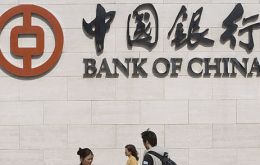
Argentina has given approval for the Industrial and Commercial Bank of China to take control of the local operations of South Africa's Standard Bank following a 600 million dollars deal last year, the Chinese lender said on Sunday.
-
Monday, November 12th 2012 - 02:46 UTC
BBC infighting the big news, while it struggles to recover from a credibility shock

The BBC's director general, George Entwistle, has resigned in the wake of the Newsnight child abuse broadcast. He said that as the man “ultimately responsible for all content, and in the light of the unacceptable journalistic standards” he would quit.
-
Monday, November 12th 2012 - 01:43 UTC
Sir Rex Hunt, Governor of the Falklands during the Argentine invasion has died

Sir Rex Hunt, the former governor of the Falkland Islands during the Argentine invasion which triggered the South Atlantic conflict of 1982 passed away in England on Remembrance Sunday.
-
Saturday, November 10th 2012 - 04:46 UTC
Major group plans cash-tender offer for low cost airline Barcelona-based Vueling
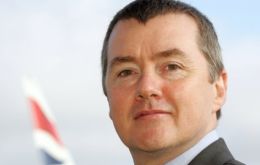
International Airlines Group has reaffirmed that it would keep Vueling as a stand-alone entity within the group if it completes its plan to acquire the outstanding shares in the Barcelona-based low-cost carrier.
-
Saturday, November 10th 2012 - 04:40 UTC
Iberia survival plan: slash quarter of jobs, cut 15% network and downsize fleet
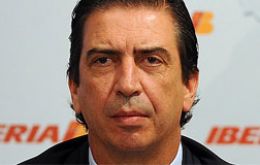
Loss-making Iberia on Friday announced plans to axe 4.500 jobs to save Spain's biggest airline from collapse and warned more cuts could follow against the backdrop of economic crisis in the Euro zone country.
-
Saturday, November 10th 2012 - 02:35 UTC
China forecasted to become world’s largest economy, ahead of the US in 2016

China is projected to overtake the US to become the world's largest economy as early as 2016, according to a report by the Organization for Economic Co-operation and Development (OECD) released on Friday.
-
Saturday, November 10th 2012 - 02:20 UTC
Argentine armed sailors prevent Ghana port officials from moving ARA Libertad

Armed sailors on board the detained Argentine ARA Libertad frigate in Ghana threatened to open fire on Ports and Harbours Authority (GPHA) officials, if they attempted to move the ship from berth 11 to berth six, at the Tema Port, according to reports of “The Chronicle” local newspaper.
-
Friday, November 9th 2012 - 06:30 UTC
Draghi confirms economic activity in Euro is “expected to remains weak”
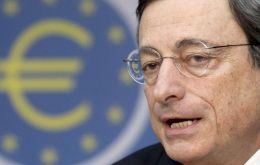
The European Central Bank (ECB) has held the benchmark Euro zone interest rate at the record low of 0.75%, as had been expected. The rate has been at this level for four months, after July's cut from 1%.
-
Friday, November 9th 2012 - 06:27 UTC
FAO October Price Index: cereals and oils down; increases in dairy and sugar

The FAO Food Price Index fell 1% in October 2012, and for the first ten months of the year food prices were on average 8% lower than in the same period in 2011. The Index dipped two points to 213 points from September's revised level of 215 points. The decline was largely due to lower international prices of cereals and oils and fats, which more than offset increases in dairy and sugar prices.
-
Friday, November 9th 2012 - 06:15 UTC
Bank of England leaves further stimuli and rate on hold
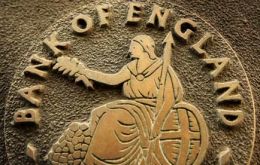
The Bank of England has decided not to extend its quantitative easing (QE) stimulus program, which has injected £375bn into the UK financial system. Under QE, the Bank creates money and uses it to buy government bonds to try to stimulate the economy.
